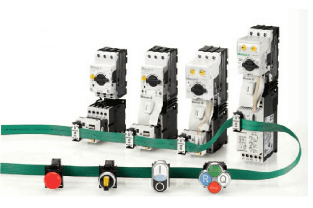Eaton Industrial Switchgear
ZE-12
Overload relay, 9-12A
Trade Price
£50.44
Per
1
Unit
EACH
Pack Quantity
1




Information
Eaton Moeller® series ZE Overload relay, Ir= 9 - 12 A, 1 N/O, 1 N/C, Direct mounting
Technical Specifications
Product Length/Depth
52 mm
Product Height
65 mm
Product Width
45 mm
Product Weight
0.078 kg
Certifications
IEC/EN 60947
VDE 0660
CE
CSA
IEC/EN 60947-5-1
UL
CSA Class No.: 3211-03
CSA-C22.2 No. 14
IEC/EN 60947-4-1
UL Category Control No.: NKCR
UL File No.: E29184
CSA File No.: 012528
UL 508
Features
Phase-failure sensitivity (according to IEC/EN 60947, VDE 0660 Part 102)
Trip-free release
Reset pushbutton manual/auto
Test/off button
Ambient operating temperature - min
-25 °C
Ambient operating temperature - max
50 °C
Ambient operating temperature (enclosed) - min
25 °C
Ambient operating temperature (enclosed) - max
40 °C
Class
CLASS 10 A
Climatic proofing
Damp heat, constant, to IEC 60068-2-78
Damp heat, cyclic, to IEC 60068-2-30
Degree of protection
IP20
Mounting method
Direct attachment
Direct mounting
Overload release current setting - min
9 A
Overload release current setting - max
12 A
Overvoltage category
III
Pollution degree
3
Product category
ZE overload relays for mini contactor relays
Protection
Finger and back-of-hand proof, Protection against direct contact when actuated from front (EN 50274)
Rated impulse withstand voltage (Uimp)
4000 V (auxiliary and control circuits)
6000 V AC
Shock resistance
10 g, Mechanical, Sinusoidal, Shock duration 10 ms
Suitable for
Branch circuits, (UL/CSA)
Temperature compensation
<= 0.25 %/K, residual error for T > 40°
Continuous
Terminal capacity (flexible with ferrule)
2 x (0.5 - 1.5) mm², Main cables
1 x (0.5 - 1.5) mm², Main cables
1 x (0.5 - 1.5) mm², Control circuit cables
Terminal capacity (solid)
1 x (0.75 - 2.5) mm², Control circuit cables
2 x (0.75 - 2.5) mm², Control circuit cables
1 x (0.75 - 2.5) mm², Main cables
Terminal capacity (solid/stranded AWG)
2 x (18 - 12), Control circuit cables
18 - 14, Main cables
Stripping length (main cable)
8 mm
Stripping length (control circuit cable)
8 mm
Screw size
M3.5, Terminal screw
Screwdriver size
2, Terminal screw, Pozidriv screwdriver
0.8 x 5.5 mm, Terminal screw, Standard screwdriver
Tightening torque
1.2 Nm, Screw terminals
Conventional thermal current ith of auxiliary contacts (1-pole, open)
6 A
Rated operational current (Ie) at AC-15, 120 V
1.5 A
Rated operational current (Ie) at AC-15, 220 V, 230 V, 240 V
1.5 A
Rated operational current (Ie) at AC-15, 380 V, 400 V, 415 V
0.7 A
Rated operational current (Ie) at AC-15, 500 V
0.5 A
Rated operational current (Ie) at DC-13, 110 V
0.4 A
Rated operational current (Ie) at DC-13, 220 V, 230 V
0.2 A
Rated operational current (Ie) at DC-13, 24 V
0.9 A
Rated operational current (Ie) at DC-13, 60 V
0.75 A
Rated operational voltage (Ue) - max
690 V
Safe isolation
300 V AC, Between main circuits, According to EN 61140
250 V AC, Between auxiliary contacts, According to EN 61140
300 V AC, Between auxiliary contacts and main contacts, According to EN 61140
Switching capacity (auxiliary contacts, general use)
1.5 A, 240V AC, (UL/CSA)
0.6 A, 600V AC, (UL/CSA)
Switching capacity (auxiliary contacts, pilot duty)
D300, AC operated (UL/CSA)
R300, DC operated (UL/CSA)
Voltage rating - max
600 VAC
Short-circuit current rating (basic rating)
15 A, max. CB, CB for max. 480 V, SCCR (UL/CSA)
45 A, max. Fuse, SCCR (UL/CSA)
5 kA, SCCR (UL/CSA)
16 A, max. CB, CB for max. 480 V, SCCR (UL/CSA)
Short-circuit protection rating
Max. 4 A gG/gL, Fuse, Auxiliary contacts
20 A gG/gL, Fuse, Type “2” coordination
35 A gG/gL, Fuse, Type “1” coordination
Number of auxiliary contacts (change-over contacts)
0
Number of auxiliary contacts (normally closed contacts)
1
Number of auxiliary contacts (normally open contacts)
1
Number of contacts (normally closed contacts)
1
Number of contacts (normally open contacts)
1
Equipment heat dissipation, current-dependent Pvid
4.2 W
Heat dissipation capacity Pdiss
0 W
Heat dissipation per pole, current-dependent Pvid
1.4 W
Rated operational current for specified heat dissipation (In)
12 A
Static heat dissipation, non-current-dependent Pvs
0 W
10.2.2 Corrosion resistance
Meets the product standard's requirements.
10.2.3.1 Verification of thermal stability of enclosures
Meets the product standard's requirements.
10.2.3.2 Verification of resistance of insulating materials to normal heat
Meets the product standard's requirements.
10.2.3.3 Resist. of insul. mat. to abnormal heat/fire by internal elect. effects
Meets the product standard's requirements.
10.2.4 Resistance to ultra-violet (UV) radiation
Meets the product standard's requirements.
10.2.5 Lifting
Does not apply, since the entire switchgear needs to be evaluated.
10.2.6 Mechanical impact
Does not apply, since the entire switchgear needs to be evaluated.
10.2.7 Inscriptions
Meets the product standard's requirements.
10.3 Degree of protection of assemblies
Does not apply, since the entire switchgear needs to be evaluated.
10.4 Clearances and creepage distances
Meets the product standard's requirements.
10.5 Protection against electric shock
Does not apply, since the entire switchgear needs to be evaluated.
10.6 Incorporation of switching devices and components
Does not apply, since the entire switchgear needs to be evaluated.
10.7 Internal electrical circuits and connections
Is the panel builder's responsibility.
10.8 Connections for external conductors
Is the panel builder's responsibility.
10.9.2 Power-frequency electric strength
Is the panel builder's responsibility.
10.9.3 Impulse withstand voltage
Is the panel builder's responsibility.
10.9.4 Testing of enclosures made of insulating material
Is the panel builder's responsibility.
10.10 Temperature rise
The panel builder is responsible for the temperature rise calculation. Eaton will provide heat dissipation data for the devices.
10.11 Short-circuit rating
Is the panel builder's responsibility. The specifications for the switchgear must be observed.
10.12 Electromagnetic compatibility
Is the panel builder's responsibility. The specifications for the switchgear must be observed.
10.13 Mechanical function
The device meets the requirements, provided the information in the instruction leaflet (IL) is observed.
Document Links
Datasheet

